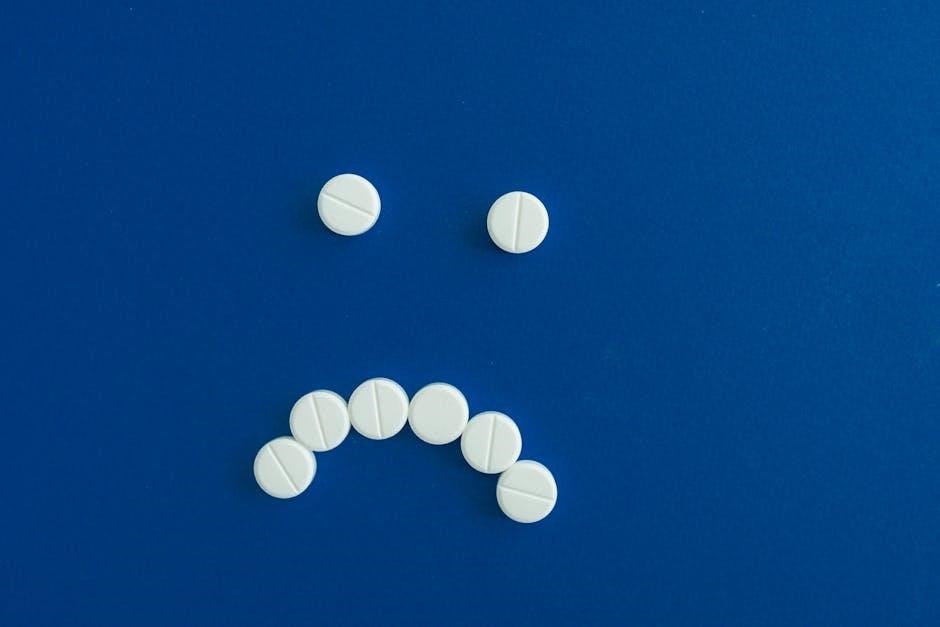Mental health medications play a crucial role in treating conditions like depression‚ anxiety‚ and bipolar disorder. They help manage symptoms and improve quality of life. A comprehensive list of these medications‚ such as antidepressants and mood stabilizers‚ serves as a valuable reference for patients and healthcare providers.

Types of Mental Health Medications
Mental health medications are categorized into several types‚ including antidepressants‚ anti-anxiety medications‚ antipsychotics‚ mood stabilizers‚ and stimulants. Each type targets specific symptoms‚ ensuring tailored treatment for various mental health conditions.
Antidepressants
Antidepressants are medications primarily used to treat depression but are also effective for anxiety disorders‚ PTSD‚ and other conditions. They work by balancing brain chemicals like serotonin and nitrates. Common types include SSRIs‚ SNRIs‚ and TCAs.
Anti-Anxiety Medications
Anti-anxiety medications are primarily used to treat anxiety disorders‚ such as generalized anxiety‚ panic disorder‚ and social anxiety. These medications help reduce symptoms like excessive worry‚ fear‚ and restlessness. Common types include benzodiazepines‚ SSRIs‚ and SNRIs.
Benzodiazepines‚ such as alprazolam (Xanax) and diazepam (Valium)‚ provide rapid relief but are typically prescribed for short-term use due to their potential for dependence. SSRIs‚ like escitalopram (Lexapro) and sertraline (Zoloft)‚ are preferred for long-term management as they have fewer side effects. SNRIs‚ including venlafaxine (Effexor) and duloxetine (Cymbalta)‚ also effectively manage anxiety by targeting serotonin and norepinephrine levels.
These medications work by altering brain chemistry to restore balance and reduce anxiety symptoms. They are often prescribed alongside therapy for optimal results. Always consult a healthcare provider before starting or adjusting anti-anxiety medications to ensure safe and effective treatment.
Antipsychotics
Antipsychotics are a class of medications primarily used to treat mental health conditions such as schizophrenia and bipolar disorder. They work by adjusting brain chemicals‚ like dopamine and serotonin‚ to reduce symptoms like hallucinations‚ delusions‚ and disorganized thinking. These medications are also sometimes prescribed for severe mood disorders or aggressive behavior.
There are two main types of antipsychotics: first-generation (typical) and second-generation (atypical). Typical antipsychotics‚ such as haloperidol‚ are older and may have more side effects‚ including movement disorders. Atypical antipsychotics‚ such as risperidone and olanzapine‚ are newer and often have fewer side effects‚ making them a preferred choice for many patients.
Commonly prescribed antipsychotics include quetiapine (Seroquel)‚ aripiprazole (Abilify)‚ and clozapine (Clozaril). These medications are essential for managing psychotic symptoms and stabilizing mood in individuals with severe mental health conditions. They are typically used alongside therapy and lifestyle changes for comprehensive care.
Mood Stabilizers
Mood stabilizers are medications used primarily to treat bipolar disorder‚ helping to manage extreme mood swings. They are essential for balancing manic highs and depressive lows. The most commonly prescribed mood stabilizers include lithium‚ valproate (Depakote)‚ and carbamazepine (Tegretol). These medications work by stabilizing neural activity in the brain‚ reducing the intensity of mood changes.
Lithium is one of the oldest and most effective mood stabilizers‚ often used as a first-line treatment for bipolar disorder. It helps prevent both manic and depressive episodes. Anticonvulsants like lamotrigine (Lamictal) are also used‚ particularly for their effectiveness in treating depressive episodes associated with bipolar disorder.
Mood stabilizers are tailored to individual needs‚ as each medication has unique benefits and side effects. They are often prescribed alongside therapy to provide comprehensive care for patients with bipolar disorder‚ ensuring better emotional stability and quality of life. These medications are crucial in managing symptoms and preventing relapses.
Stimulants
Stimulants are a class of medications primarily used to treat attention deficit-hyperactivity disorder (ADHD). They work by increasing the activity of neurotransmitters like dopamine and norepinephrine in the brain‚ improving focus‚ attention‚ and impulse control; Common stimulants include methylphenidate (Ritalin‚ Concerta) and amphetamine (Adderall‚ Vyvanse). These medications are also sometimes prescribed off-label for conditions such as narcolepsy or certain cases of depression;
Stimulants are available in both immediate-release and extended-release forms‚ allowing for flexible dosing options. While they are highly effective‚ they can have side effects like insomnia‚ increased heart rate‚ or anxiety. Proper medical supervision is essential to manage these effects and ensure safe use. Stimulants are a cornerstone in ADHD treatment‚ helping individuals lead more balanced and productive lives. Always consult a healthcare provider before starting or adjusting these medications.

Mechanism of Action
Mental health medications work by altering brain chemistry to reduce symptoms of mental disorders. They primarily target neurotransmitters‚ such as serotonin‚ dopamine‚ and norepinephrine‚ which play key roles in mood‚ motivation‚ and emotional regulation. Antidepressants‚ for example‚ increase serotonin levels to improve mood‚ while antipsychotics block dopamine receptors to reduce hallucinations. Mood stabilizers like lithium balance neuronal activity‚ preventing extreme mood swings. Stimulants enhance focus by boosting dopamine and norepinephrine. Anti-anxiety medications‚ such as benzodiazepines‚ enhance GABA‚ promoting relaxation. Each medication class has a distinct mechanism‚ tailored to specific conditions. Understanding these mechanisms helps in selecting the most effective treatment. However‚ individual responses vary‚ and some mechanisms are not fully understood. Regular monitoring by healthcare providers ensures safety and effectiveness. This targeted approach highlights the importance of personalized treatment in mental health care.

Common Mental Health Medications
Commonly prescribed mental health medications include antidepressants like Escitalopram and Fluoxetine‚ antipsychotics such as Risperidone‚ and mood stabilizers like Lithium. These medications are widely used to treat conditions like depression‚ anxiety‚ and bipolar disorder effectively.

List by Category
Mental health medications are categorized based on their therapeutic use and mechanism of action. Below is a structured list organized by category:
- Antidepressants: Includes SSRIs like Escitalopram (Lexapro) and Fluoxetine (Prozac)‚ SNRIs such as Duloxetine (Cymbalta)‚ and TCAs like Amitriptyline.
- Anti-Anxiety Medications: Features benzodiazepines like Alprazolam (Xanax) and Lorazepam (Ativan)‚ as well as non-benzodiazepines such as Buspirone (Buspar).
- Antipsychotics: Includes first-generation drugs like Haloperidol and second-generation medications such as Risperidone (Risperdal) and Quetiapine (Seroquel).
- Mood Stabilizers: Commonly includes Lithium‚ Valproate (Depakote)‚ and Lamotrigine (Lamictal)‚ often used in bipolar disorder.
- Stimulants: Used primarily for ADHD‚ examples include Methylphenidate (Ritalin) and Amphetamine (Adderall).
This categorization helps in understanding the role of each medication in treating specific mental health conditions‚ providing a clear reference for healthcare providers and patients.
Examples and Uses
Mental health medications are prescribed for specific conditions‚ with each category serving distinct purposes. For instance‚ Escitalopram (Lexapro)‚ an SSRI‚ is commonly used to treat anxiety and depression by balancing serotonin levels. Alprazolam (Xanax)‚ a benzodiazepine‚ is often prescribed for acute anxiety and panic disorders due to its calming effects on the central nervous system. Lithium‚ a mood stabilizer‚ is frequently used in managing bipolar disorder to prevent extreme mood swings. Additionally‚ Methylphenidate (Ritalin)‚ a stimulant‚ is prescribed for ADHD to improve focus and reduce hyperactivity. These examples highlight how each medication is tailored to address specific symptoms and conditions‚ providing targeted relief and improving overall mental well-being.

Side Effects
Mental health medications can cause side effects‚ ranging from mild to severe. Common effects include drowsiness‚ dizziness‚ and changes in appetite or sex drive. Rare but serious effects may include suicidal thoughts‚ seizures‚ or extreme mood changes.
Common Side Effects
While mental health medications can be highly effective‚ they often come with side effects. Common side effects include drowsiness‚ dizziness‚ changes in appetite‚ weight gain‚ nausea‚ fatigue‚ insomnia‚ dry mouth‚ increased heart rate‚ and sexual dysfunction. These effects vary by medication type and individual response. For example‚ antidepressants like SSRIs may cause stomach upset or sleep changes‚ while antipsychotics can lead to weight gain or drowsiness. Anti-anxiety medications‚ such as benzodiazepines‚ may cause dizziness or dependency. Mood stabilizers‚ like lithium‚ can affect kidney function or cause tremors. Stimulants‚ used for ADHD‚ often result in insomnia or increased anxiety. It’s important to discuss these potential effects with a healthcare provider‚ as some may subside over time. Monitoring and adjustments can help minimize discomfort and ensure treatment effectiveness. Always report persistent or bothersome side effects to your doctor to explore alternatives or dosage adjustments.
Serious Side Effects
Although rare‚ mental health medications can cause serious side effects that require immediate medical attention. These include severe allergic reactions‚ such as difficulty breathing or swelling of the face‚ lips‚ or tongue. Some antidepressants may increase suicidal thoughts or behaviors‚ particularly in young adults. Antipsychotics can lead to neuroleptic malignant syndrome‚ a life-threatening condition characterized by high fever‚ muscle stiffness‚ and altered mental status. Mood stabilizers like lithium can cause kidney or thyroid problems‚ while anticonvulsants may lead to blood disorders. Stimulants‚ used for ADHD‚ may result in heart problems‚ such as increased blood pressure or irregular heartbeat. Anti-anxiety medications‚ especially benzodiazepines‚ carry a risk of dependence and withdrawal symptoms. In rare cases‚ medications can cause severe mental changes‚ such as hallucinations or thoughts of self-harm. It’s crucial to monitor for these symptoms and seek emergency care if they occur. Always follow your doctor’s guidance and report any concerning changes promptly.

Factors Influencing Medication Choices
Several factors influence the selection of mental health medications‚ ensuring personalized treatment plans. The primary consideration is the effectiveness of the medication for the specific condition being treated. Healthcare providers also evaluate the potential side effect profile to minimize risks‚ especially for patients with pre-existing medical conditions. Patient history‚ including past responses to medications and any allergies‚ plays a critical role. Age and vulnerability‚ such as in children or the elderly‚ are additional considerations‚ as some medications may have age-specific risks. Lifestyle factors‚ such as adherence to treatment regimens and potential drug interactions‚ are also assessed. Cost and accessibility of the medication may influence choices‚ particularly for patients without comprehensive insurance coverage. Finally‚ the psychiatrist’s clinical judgment and evidence-based guidelines guide the decision-making process to ensure the most appropriate treatment. These factors interact uniquely for each individual‚ making medication selection a highly personalized process.

Lifestyle Considerations
Lifestyle factors significantly impact the effectiveness of mental health medications and overall well-being. Patients are often advised to avoid alcohol and drugs‚ as they can interact negatively with medications and worsen symptoms. A healthy diet and regular exercise can enhance the benefits of treatment and improve mental health outcomes. Stable sleep patterns are also crucial‚ as sleep disturbances can exacerbate symptoms. Avoiding smoking and excessive caffeine intake is recommended‚ as these can interfere with medication efficacy and increase anxiety. Stress management techniques‚ such as mindfulness or therapy‚ can complement medication therapy. Additionally‚ maintaining a structured daily routine helps patients adhere to their treatment plans. Open communication with healthcare providers about lifestyle habits ensures personalized care. By addressing these factors‚ individuals can optimize their mental health treatment and achieve better quality of life.

Importance of a Comprehensive PDF List
A comprehensive PDF list of mental health medications is an invaluable resource for patients‚ caregivers‚ and healthcare providers. It provides a centralized‚ organized‚ and easily accessible format for understanding various medications‚ their uses‚ side effects‚ and dosages. This list ensures that critical information is available in one place‚ reducing the need to search through multiple sources. For patients‚ it enhances understanding of their treatment options and fosters informed decision-making. Caregivers can use it to monitor medications and manage care effectively. Healthcare providers benefit from having a quick reference guide to review medications and their interactions. A well-structured PDF list also aids in tracking updates in psychiatric pharmacology‚ ensuring that the information remains current. Its portability allows access offline‚ making it a practical tool for consultations and emergencies. Ultimately‚ a comprehensive PDF list promotes better adherence to treatment plans and improves overall mental health care outcomes by providing clear‚ concise‚ and actionable information. This resource is essential for anyone involved in mental health treatment and management.

How to Create a Mental Health Medications PDF List
Creating a mental health medications PDF list involves organizing essential information about commonly prescribed drugs. Start by sourcing data from reputable organizations like the National Institute of Mental Health (NIMH) or Psychiatry.org. Include medication names‚ both brand and generic‚ along with their primary uses‚ dosages‚ and potential side effects. Organize the list alphabetically or by medication category (e.g.‚ antidepressants‚ antipsychotics). Use clear formatting‚ such as tables or bullet points‚ to enhance readability. Add visual separators between entries to improve navigation. Regularly update the list to reflect new FDA approvals or changes in treatment guidelines. Export the document as a PDF to ensure compatibility across devices. Consider including a section for notes or updates to keep the list dynamic. This comprehensive guide serves as a valuable resource for patients‚ caregivers‚ and healthcare providers‚ fostering better understanding and adherence to treatment plans.


